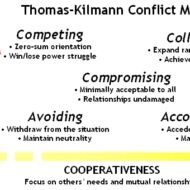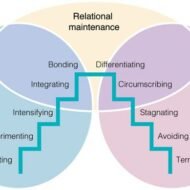Posted by Managementguru in Human Resource, Organisational behaviour, Principles of Management, Strategy, Training & Development
on Mar 31st, 2014 | 0 comments

Conflict is a Part of Organizational Life Managers need to be alert to the presence of conflicts. Their focus should be oriented towards the goals to be accomplished. If there is a conflict, they should aim to resolve it smoothly by not over-reacting to the situation. They should take the help of persons who can best settle the issue, be ready to bargain and not issue orders. Their concentration should be on the problem and not on persons. True to the saying – Am I not destroying my enemies when I make friends of them?- President Abraham Lincoln Conflicts are Functional and Healthy: Conflicts in organisations are generally considered to be dysfunctional. On the contrary, many top executives of big companies view conflicts, as a means, to sufficiently analyse a problem and postpone decision making until all critical aspects of an issue are evaluated properly. Conflicts may occur within the individual, between individuals, between the individual and the group or between groups. There are many potential sources of conflict in today’s corporate organisations. The complex inter personal relationships and high degree of interdependence causes friction. Difference of Opinion: When many people must work together, conflict is inevitable, as it is human nature to clash and complain. Conflict is the personal divergence of interests between groups or individuals. The need to share scarce resources, difference in goals between organisational units, difference in values, attitudes and perception, ambiguously defined work responsibilities are some of the major sources of conflict. Functional Conflicts: Functional conflicts support the goals of a group, improve its performance and are constructive in nature. Dysfunctional conflicts hinder the performance of a group and are destructive in nature. It has not been precisely defined, as to what criterion demarcates functional from the dysfunctional. It is only the group’s performance and the delivered result or outcome that determines the nature of the conflict. Conflicts, irrespective of their type can bring these benefits to the firm: Bring hidden issues to the surface. Encourage creativity and innovation. Improves communication and make changes more acceptable. Increases group cohesion. Strategies to Resolve Conflicts: So, what kind of strategy do you think best suits in resolving conflicts? Avoiding or smoothing conflicts may be a temporary measure, only to bounce back in full force. Forcing might create undesirable consequences. The only option left is to confront the situation, face-to-face meeting of the conflicting parties for the purpose of identifying the problem and resolving it through an open discussion. Make Structural Changes to Lessen Conflicts: By making structural changes, conflicts can be managed. The objectives of a group are modified and then integrated to suit the purpose. Also changes in the structure of the organization, that is, clarification of authority-responsibility relationship, improving the working atmosphere, ambience and work locations help in resolving conflicts. Proper Communication: Lack of proper communication, ego clashes between the people in line and staff positions, a superior’s autocratic leadership style, differing educational backgrounds, lack of co-ordination between inter-departments are all rich sources of conflict. These can be resolved with the right kind of attitudinal approach and an open mind from the management’s...

Posted by Managementguru in Human Resource, Motivation, Organisational behaviour, Principles of Management, Training & Development
on Mar 31st, 2014 | 0 comments

Human Behavior- A Psychodynamic Approach In any organization, utmost importance is given to human resource management. Handling or manipulating other resources like physical, financial or production is at your discretion. When it comes to managing your employees, there you go! You start feeling the pinch. Man is like a “live wire” and if you don’t possess the mastery to understand and utilize the power behind his psyche, then you are at a loss and you are not capable of what is called “the wizard touch”. Maintaining the Employee Morale: The main problem with your subordinates or even with yourself might be boosting up of morale. Always keeping yourself in a cheerful proposition will take you to greater heights, as it helps you to achieve your goals faster. Human strength lies in self belief which is his reserved store of strength, the one which he never utilizes or not allowed to utilize to the fullest extent possible. A bureaucratic or autocratic manager should understand the fact that when human mind is given a chance to explore with full freedom instead of following orders it comes out with the greatest ideas; which may prove fruitful to your organization in a big way. Make Your Work-force Dynamic: If a person wants to become successful in a business venture, he should possess the fire of unfailing enthusiasm and the nerve to face the adversities that come in his way. Life is a game and so is business. You can play the game fearlessly when you are backed up by like minded individuals who will carry on your fire to the next level. So it is important on your part to prepare your subordinates to adapt to the different dimensions of the business atmosphere and make them more dynamic. Human mind has the power to grasp things faster than what we assume it to be. Even average performers can be transformed into star performers when, The work itself is appealing, yielding and useful The work has scope for independent activities The Work defines goals or targets The social atmosphere created by the manager is warm Innovative ideas are welcome Empathy on part of the manager The Power of Relaxation: Another important aspect for the betterment of human psyche is relaxation. A relaxed mind can achieve things hundred times better. People who are always on the run have the feeling that they have not accomplished much. If you keenly observe, only 8 hours of productive work is done every day. In order to accomplish whatever you have in your agenda, you definitely need to relax and plan. The art of resting the mind and the power to dismiss all worries and exhaustion is probably the winning formula. The employer who secures the goodwill of his employees can accomplish more with less effort and exhaustion. Try to bring out the creativity of your subordinates to make the climate of your firm cordial and the attitude...

Posted by Managementguru in Decision Making, Entrepreneurship, Human Resource, Principles of Management
on Mar 20th, 2014 | 0 comments

How Women Entrepreneurs are Viewed by the Society An entrepreneur is one person who has the ability to think out of the box, to cash in on the opportunities, to think big and different, to go for innovative ideas, to take warranted risks and to make a difference amongst the ordinary lot. Modern business world and the society as a whole have understood the importance of women emerging as successful and powerful entrepreneurs which has proven good for the growth of a country’s economy. Challenges of being a woman: The challenges start at the grass root level: being a woman is sufficient enough to create a gender bias and to be looked down. Physically the differences are obvious and the strength that a man is empowered with cannot be overruled, but the inner strength and the power to conquer that a woman is empowered with can never be equaled. Running a household is even more difficult than running a corporate business. All your management principles come under the household umbrella. No tactics or strategy is left unturned for the smooth running of the household. A woman needs no training in areas of strategic planning decision making(comes naturally) developing interpersonal relationship delegating authority decentralization managing leadership motivating others and self motivation crisis management impression management quality of work Women CEO’s add Value to their Companies: Nature has blessed her with all these and many more managerial qualities that are needed to manage an organization effectively and efficiently. Gone are the days when they were treated a step down, now most of the corporates have very efficient women CEO’s and their ability is reflected in terms of productivity and profitability. Moreover a woman adds value to the company as responsibility is her second name and this works out in favor of the organization to gain the trust and confidence of its consumers, suppliers and stake holders. A woman can occupy any post of its highest kind including the presidential or prime ministerial positions. The enthusiasm that a woman entrepreneur exuberates is infectious and induces positive vibes in the organization. Be it negotiations, tackling the union leaders and workers, business travels or bargaining, nothing is a problem. She is more efficient in clinching deals and proves adventurous in concluding new business ventures. Work – Life Balance: A woman has to have a balance between her family, relationships, children and work. That is the biggest ever challenge which she handles with ease. The financial pinch that the recent economy has created has served as an eye opener for men in realizing the fact that a house needs two financial paymasters for running the show. Success Ratio of Women Entrepreneurs: Many few women entrepreneurs emerge out as victors as most of them lack support from their counterparts and lack of financial support from banks, financial institutions may also slacken the pace and hinder their progress. The success ratio has considerably increased when compared to olden days but still many of them lack the nerve to start their own business. Ignorance and lack of self reliance are the major factors hindering the development of female entrepreneurs. I have seen many women who are born in business families with natural business instinct and their added advantage would be the already available infrastructure, platform and guidance to grow and make it to the top. Even circumstances force certain women to go in for self owned business and once they taste the essence of success they never want to look back. The society has a bigger role to play in developing more women entrepreneurs by giving positive support. Women have a better judgement on role analysis and perception which turn them into better role models in any field or...

Posted by Managementguru in Decision Making, Human Resource, Organisational behaviour, Principles of Management, Training & Development
on Mar 19th, 2014 | 0 comments

How to Grade Your Employees on Their Performance Performance appraisal is the process of obtaining, analyzing and recording information about the relative worth of an employee. Organizational Development: Organizational Development denotes an overall and comprehensive development of an organization supported by the entire team of employees working for that organization. A useful technique in the management process that serves as a measure of performance and productivity is “performance evaluation” or performance appraisal. Performance refers to the degree of accomplishment of the task that makes up an individual’s job. Performance appraisal serves the following purpose: To assess the present levels of employee performance. To understand the future needs in training and development based on the strengths and weaknesses of the employees. To provide feedback on their performance. Serves as a basis for reward allocation, such as, increase in pay scale, promotions and many other decisions like, confirmations, transfer, demotion etc. , Establishes performance standards and offers scope for improvement. Acts as a motivational tool for workers to perform better. Checks and facilitates employees who exhibit poor performance. Also assesses behavioral pattern of the employees. People who work for big corporate companies identify themselves with the objectives of the company and expect feedback, either in the form of a compliment or criticism. Compliments act as morale boosters to perform better and criticism though initially might puncture the ego, induces the potential to perform, to prove oneself. Managers should never be reluctant on their part to appraise subordinates on the job expectations and demands. In an activity as important as managing, there must be no pitfalls to measure performance as accurately as possible. The Appraisal Process: The next important aspect in the appraisal process would be deciding the content to be appraised. Individual task outcomes where performance is evaluated on the outcomes delivered by the individuals, evaluation of personal characteristics and traits or behavior are done to rate the employees as to where they stand in terms of performance. Appraisal Techniques: The widely used managerial technique in the appraisal process is evaluating performance against verifiable objectives, which truly makes sense, because the employees would be blind folded if they don’t have the right direction to proceed. Evaluation can be done in a comprehensive, periodic or continuous fashion. It all depends on the nature of work done, company practice and other situational factors. Say, for instance, performance review can be done after the completion of a major project, that makes sense, doesn’t it? Periodical reviews: Formal reviews can be supplemented and supported with frequent and short informal reviews, for the superior- subordinate relationship to prosper and to keep communication channels open. All said and done, performance review based on verifiable objectives, although gives better vision and clarity, doesn’t allow the manager or subordinate to grow individually. It does not help in personality development, the emphasis ever being focused on accomplishing the operating objectives. The 360 Degree Apparaisal: The latest approach of performance evaluation is the 360 degree appraisal that well suits the managerial cadre. It provides for performance feedback from the full circle of daily contact, that a manager might have, ranging from customers, peers, subordinates, boss etc. , This also fits into organizations that have introduced teams, employee participation and total quality management...

Posted by Managementguru in Business Ethics, Business Management, Decision Making, Principles of Management, Strategy
on Mar 11th, 2014 | 0 comments

VEDIC MANAGEMENT AND LEADERSHIP INDIAN MANAGEMENT AND VEDIC LEADERSHIP From time immemorial, vedic scriptures and Upanishads have inspired people to acquire knowledge and wisdom about management principles and practices. Great spiritual leaders like Adisankara believed to be the reincarnation of Lord Shiva, Shri Krishna, the reincarnation of Lord Mahavishnu ,Lord Buddha, Shri Ramakrishna Paramahamsa have spoken of the infinite realities of life . The Philosophy of Unlearning: It is really amazing to know that these teachings though popular for their philosophical perspective also are a source of inspiration for management philosophy. These scriptures are excellent guides for attaining focus and help us to unlearn old school of thought and rejuvenate us with proper perspective and approach. Inspiration from Bhagavat Gita: Most of us would have heard about this quote from the Bhagavat Gita- “Do your duty without expectations”- “The fruits of which will be reaped automatically.” I used to wonder if this is possible, but all business men and entrepreneurs will definitely go by this since it proves to be the highest business philosophy too. Businesses thrive when done with a perfect vision , backed up by strong policies and ethical procedures. Adisankara: Adhi sankara has already paved the way for “Equality among the masses” when he realized and reiterated that people cannot be and should not be discriminated based on their caste and creed. His life span was very short-he was hardly 32 years when he left this world, but his preachings are there to stay forever. He was definitely a natural leader in presenting his views with clarity that serve as an eternal guide for mankind. Lord Krishna – A Magnificient Leader: Leaders ought to be natural and inspire people to follow them willingly. Lord Krishna was such a magnificient leader of Dwabara yuga who was a mentor for the Pancha pandavas and Gauravas too. The sad part of the story was Gauravas were not willing or not wise enough to utilise the services of Lord Krishna. We miss many viable business opportunities by oversight like Duryodana, the leader of Gauravas- he was a great warrior but not a good listener. “To be heard, you have to first listen,” I think this is the first step in the process of management Progress is impossible without change and those who are not willing to change cannot change anything. How true these words of George Bernardshaw are! Leaders of next century need to have better adaptive capabilities, cross-functional expertise, a positive attitude towards unlearning and re learning and also develop leadership of various levels of organization. What do Vedic Scriptures say? Coming back to vedic scriptures, they direct the mankind towards purifying the mind so that it becomes the hot seat of infinite energy leading to higher levels of strategic thinking and performance. The problem with us is that we always tend to correlate spirituality with renunciation of worldly life- It is not that; making the energy chakras inside our body live and active is the saarams ( essence) taking us to a heightened level in terms of thinking and action. To be a good leader your health should be fine in three key areas 1. Mental health Intelligence and creativity at its best Increased self-actualisation and self-confidence Greater ability to focus Higher levels of moral judgement Reduced anxiety and depression 2. Physical health Reduced need (or no need) for seeing the doctor for treatment Decreased risk factor for disease Reduction of high blood pressure Decreased alcohol consumption and drug abuse Stress reduction Prevention of ageing and increased longevity Note: It has been scientifically proved that by reciting GAYATHRI MANTRA and performing Sandhya vandanam, which is a natural yoga or pranayama method, your life...










